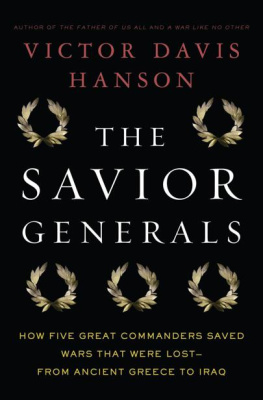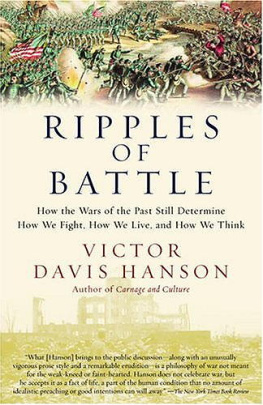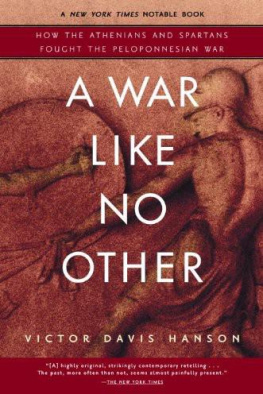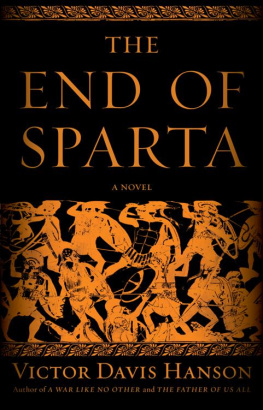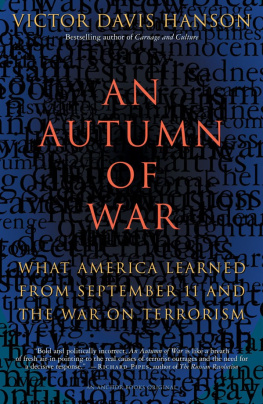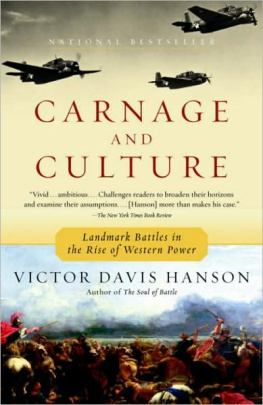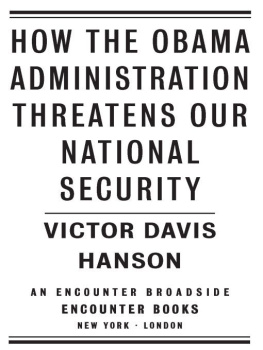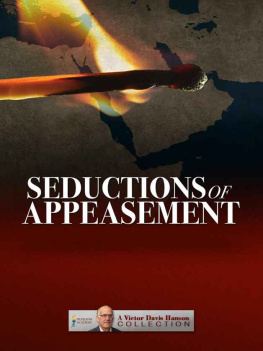THE FATHER OF US ALL
B Y T H E S A M E A U T H O R
Warfare and Agriculture in Classical Greece
The Western Way of War
Hoplites (editor)
The Other Greeks
Fields Without Dreams
Who Killed Homer? (with John Heath)
The Wars of the Ancient Greeks
The Soul of Battle
The Land Was Everything
Bonfire of the Humanities (with John Heath and Bruce Thornton)
An Autumn of War
Carnage and Culture
Between War and Peace
Mexifornia
Ripples of Battle
A War Like No Other
The Immigration Solution (with Heather MacDonald and Steven Malanga)
Makers of Ancient Strategy (editor)
THE FATHER OF US ALL
War and History, Ancient and Modern

VICTOR DAVIS HANSON
Co-director, the Group on Military History and
Contemporary Conflict, the Hoover Institution,
Stanford University

B L O O M S B U R Y P R E S S
New York Berlin London
Copyright 2010 by Victor Davis Hanson
All rights reserved. No part of this book may be used or reproduced in any manner whatsoever without
written permission from the publisher except in the case of brief quotations embodied in critical articles
or reviews. For information address Bloomsbury Press, 175 Fifth Avenue, New York, NY 10010.
Published by Bloomsbury Press, New York
LIBRARY OF CONGRESS CATALOGING-IN-PUBLICATION DATA
Hanson, Victor Davis.
The father of us all : war and history, ancient and modern / by Victor Davis Hanson.1st ed.
p. cm.
ISBN 978-1-60819-165-9 (hardback : alk. paper)
1. WarHistory. 2. Military history. I. Title.
U27.H378 2010
355.0209dc22
2009041714
First published by Bloomsbury Press in 2010
This e-book edition published in 2010
E-book ISBN: 978-1-60819-294-6
www.bloomsburypress.com
To the soldiers
of the American military
for all that they do.
War is the father of all and king of all.
Heraclitus,
fragment 22B53
C ONTENTS
MILITARY HISTORY: THE ORPHANED DISCIPLINE
WHY STUDY WAR?
CLASSICAL LESSONS AND POST-9/11 WARS
RAW, RELEVANT HISTORY: FROM THE 300 SPARTANS TO THE HISTORY OF THUCYDIDES
WAR WRITING
THALATTA! THALATTA!
THE OLD BREED
THE WAR TO BEGIN ALL WARS
DON JUAN OF AUSTRIA IS RIDING TO THE SEA
THE POSTMODERN MEETS THE PREMODERN
THE END OF DECISIVE BATTLEFOR NOW
MEN MAKE A CITY, NOT WALLS OR SHIPS EMPTY OF MEN
THE AMERICAN WAY OF WARPAST, PRESENT, AND FUTURE
HOW WESTERN WARS ARE LOSTAND WON
YOUR DEFEAT, MY VICTORY
THE ODD COUPLEWAR AND DEMOCRACY
WHO IS THE ENEMY?
S OME PORTIONS OF these essays have appeared in various publications or derive from transcripts of public lectures I delivered. In every case, however, I have greatly expanded, rewritten, and updated each chapterand, in many instances, combined two or three earlier shorter articles, along with entirely fresh material, to form these newly titled longer essays.
Two themes resonate throughout the book: the unchanging face of war and the tragic nature of its persistence over the ages. Despite the purported novelty of todays so-called war on terror, and the public furor and controversies that arose over the wars of this new millennium, conflict in the present age still remains understandable to us through careful study of the past.
War is an entirely human enterprise. Even with changing technologies and ideologies, and new prophets of novel strategies and unconventional doctrines, conflict will remain the familiar father of us allas long as human nature stays constant and unchanging over time and across space and cultures.
War seems to be inseparable from the human condition. I do not wish to venture into the controversy about whether war is innate to the human gene pool, or whether aggression is characteristic of our evolution. Rather, as an empiricist, I note only that warlike birth, aging, death, politics, and age-old emotions such as fear, pride, and honorhas never disappeared. This so-called tragic view concedes that depressing fact about the human condition, and yet it steels the individual to the notion that suffering is a part of our human lot, and unfortunately cannot be entirely eradicated by any amount of well-intended nurturing.
Yet acceptance of the frequent horror of war does not equate to either an approval of or an abject inability to avert particular conflicts. If military history suggests that it is almost impossible to outlaw outright by statute, or eliminate entirely through progressive education, legalized killing on a grand scale, it nevertheless offers the hope that we can learn from the past in order to both lessen the frequency and mitigate the severity of particular conflicts. As the Athenian dramatist Sophocles teaches us, the stuff of tragedy is the endless struggle against something deep and persistentand unpleasantwithin ourselves.
In short, this book is a small attempt in these confusing times of high technology and intellectual haughtiness to remind us that past wars still best explain present conflicts.
I wish to thank the Hoover Institution, Stanford University, for help in preparing the manuscript. In particular I owe a debt of gratitude to Bill and Nancy Myers, and their children, Mary Myers-Kauppila and George Myers, for their support for my work, including the thinking contained in the essays herein. The Myers family has long demonstrated to the Hoover Institution its appreciation of scholarship in the classics, especially its application to contemporary history.
VICTOR DAVIS HANSON
November 1, 2009
Military History:
The Orphaned Discipline
Why Study War?
Military History Teaches Us About the Tragic Inevitability of Conflict
Military History?How Odd
T RY EXPLAINING TO a college student that Tet was, in fact, an American military victory. Or, in contrast, suggest that the Vietnamese offensive of 1968 was a stunning enemy success. Either way, you will not provoke a counterargumentlet alone an assentbut a blank stare: Who or what was Tet?
When doing some radio interviews about the recent hit movie , I encountered similar bewilderment about battles of the past from both listeners and hosts. Not only did most of them not know who the movies eponymous three hundred Spartans were or what Thermopylae was, but they also seemed clueless about the Persian Wars altogether. Was not Marathon a long-distance race, nothing more?
Americans tend to lack a basic understanding of military matters. Even when I was a graduate student, thirty-some years ago, military historyunderstood broadly as the investigation of why one side wins and another loses a war, and encompassing reflections on magisterial or foolish generalship, technological stagnation or breakthrough, and the roles of discipline, bravery, national will, and culture in determining a conflicts outcome and its consequenceshad already become unfashionable on campus. Today, universities seem even less receptive to the subject.
This state of neglect in our schools is profoundly troubling. Democratic citizenship requires knowledge of warand now, in the age of weapons of mass annihilation, more than ever.
I came to the formal study of warfare in an odd way at the age of twenty-four. Without ever taking a class in military history, I naively began writing about war for a Stanford University classics dissertation that explored the effects of agricultural devastation in ancient Greece, especially the Spartan ravaging of the Athenian countryside during the Peloponnesian War. The rather esoteric topic seemed far more complex than merely attacking farms. Was the Spartan strategy really all that effective? Why assume that ancient armies with primitive tools could easily burn or cut trees, vines, and grain on thousands of acres of enemy farms? On my family farm in Selma, California, it took me almost an hour to fell a mature fruit tree with a sharp modern ax, and it usually wasnt easy to burn grain, except during a brief dry period in late spring and summer.
Next page

